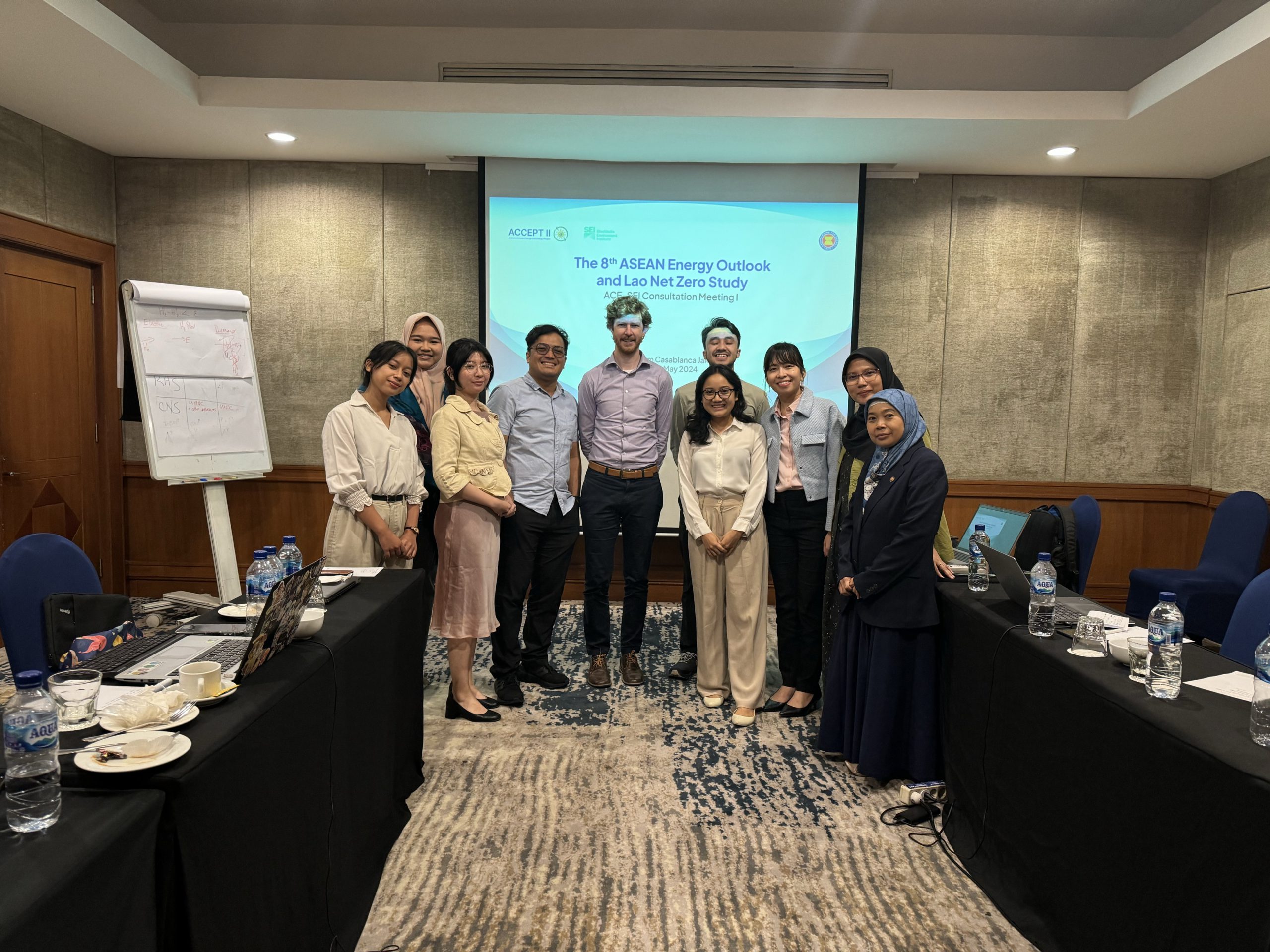i
i
Jakarta, 21 May 2024

Photo 1. ASEAN Centre for Energy (ACE) and Stockholm Environment Institute (SEI) Representative
The ASEAN Centre for Energy is on the course of launching its flagship publication The ASEAN Energy Outlook (AEO). Its eighth rendition, The 8th ASEAN Energy Outlook (AEO8), will be a critical input for the next cycle of the ASEAN Plan of Action for Energy Cooperation (APAEC)—colloquially referred to as the ASEAN Energy Blueprint—set to be presented in the 43rd ASEAN Ministers on Energy Meeting (AMEM) that will take place in 2025.
Like its predecessors, AEO8 will incorporate sets of scenarios to predict the trajectory of ASEAN’s energy industry. It will incorporate least-cost optimizations for all sectors while keeping the 2025 APAEC targets and adding a few constraints post-2025 that are agreed upon by AMS.
The ASEAN Climate Change and Energy Project (ACCEPT) Phase II contributing to the carbon neutrality model, as one of ACCEPT II’s outcomes is to enhance ASEAN’s capacity for a low-carbon economy, achieved through regional- and national-level energy system modeling in pursuit of carbon neutrality, commonly referred as “net zero”. Efforts conducted by ACCEPT II can be seen as an extension towards the implementation of the ASEAN Strategy for Carbon Neutrality, which was endorsed by ASEAN Economic Ministers last year. Through eight strategies and 16 priority initiatives, the strategy marks ASEAN’s commitment towards net zero by acknowledging the economic opportunities that entails during the green energy transition.
Another initiative led by ACCEPT II concerning national-level energy system modeling is the net zero study with a working title of An Energy Sector Roadmap to Net Zero in the Lao People Democratic Republic (Lao PDR). Using the momentum of Lao PDR’s ASEAN Chairmanship this year, this joint study with Lao PDR Ministry of Energy and Mines is intended to support the country’s attainment of their climate targets, contained within their updated Nationally Determined Contribution.

Photo 2. Taylor Binnington from SEI discussion with ACE attendees
To support capacity building in energy modeling, ACCEPT II supports the Consultation Meeting between ACE and the Stockholm Environment Institute (SEI). Held in Jakarta on 15-21 May 2024, the week-long event conducted discussion and validation of the results for all four AEO8 scenarios modeling, as well as updating the model for the Lao PDR Net Zero Study. The first three days were aimed at improving the status quo model for the trajectories of energy demand, supply, and transformation. The fourth day was geared towards improving the Lao PDR net zero model by going through the roadmap’s metrics, viable technology options, carbon sink, and incorporation of the ASEAN Power Grid. Lastly, the agenda for the fifth day was to discuss preparations for upcoming relevant events such as for all seven Sub-Sectoral Network (SSN) Meetings, the second AEO8 Consultation Meeting that will take place at the end of May, and the way forward for Lao PDR Net Zero Study.
The consultation meeting was kicked off by ACE Senior Analyst Rika Safrina, providing an overview of AEO8 scenarios and current progress. SEI Scientist Taylor Binnington, who acted as the consultant for the modeling framework, highlighted the longstanding collaboration between ACE and SEI which can be traced back from the development of AEO6. The ACCEPT II team, represented by Associate Research Analyst Indira Pradnyaswari, Research Analyst Muhammad Ilham Rizaldi, and Senior Research Analyst Aldilla Noor Rakhiemah supported the event and gave their contribution on this consultation session.
The week-long workshop saw the group navigate around issues to harmonize their modeling algorithm. Deciding upon relevant assumptions hence becomes an important step for developing a more realistic model, especially in areas where data discrepancies were found. The productive discourse taking place throughout the whole workshop enhances our researchers’ capability to model a net zero future for ASEAN. By extension, it also enhances ASEAN’s confidence and capacity to plan a low-carbon economy inspired by the peaceful, stable, and resilient ASEAN Community, as envisioned by the ASEAN Community Vision 2025.

Photo 3. Consultation attendees collaborated to enhance the AEO8 energy modelling algorithm
Moving forward, ACCEPT II and ACE recognize the importance of data in developing models for a low-carbon future. Data-driven policymaking is a chief measure to address challenges posed within the energy-climate nexus. ACCEPT II and ACE henceforth will continue to support AMS policymakers’ decision-making, which in the current context is through the provision of accountable models contained within AEO8 and Lao PDR Net Zero Study. Both products eventually support the highest decision-making for setting the course of the region’s energy sector trajectory, which is tangibly represented by the next cycle ASEAN Energy Blueprint APAEC, set to be published on the 43rd AMEM in 2025.
(SNF)
Join our ASEAN Researchers Network on Climate Change (ARNECC) by registering yourself here. Become a part of our collaborative efforts to address pressing climate challenges and shape a sustainable future.
Detailed information on ACCEPT II can be found at https://accept.aseanenergy.org/
We welcome any future collaboration, please feel free to contact us at [email protected]